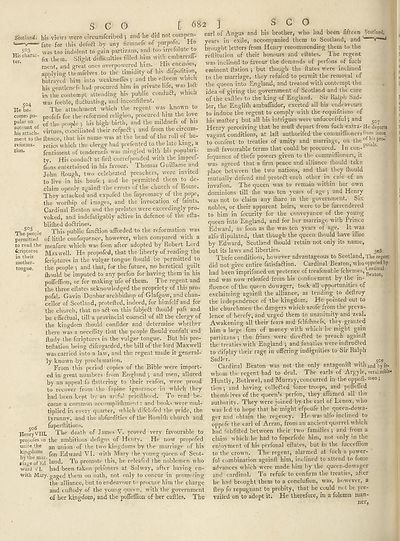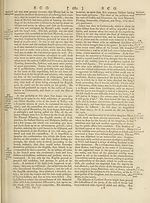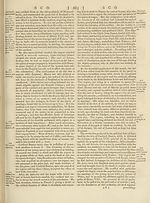Encyclopaedia Britannica, or, a Dictionary of arts, sciences, and miscellaneous literature : enlarged and improved. Illustrated with nearly six hundred engravings > Volume 18, RHI-SCR
(720) Page 682
Download files
Complete book:
Individual page:
Thumbnail gallery: Grid view | List view

S°4
He be-
retorrna
lion.
SCO [ 68
Scotland, his views tvere circumfcribed ^ and he did not compen-
fate for this deteft by any firmnefs of purpole. He
s°3 was too indolent to gain partisans, and too irrefolute to
Hiscnarac- ^ lhem> Slight difficulties filled him with embarrall-
nient, arid great ones overpowered him. His enemies,
applying themfelves to the timidity of his diipofition,
betrayed him into weakneffes *, and the elleem which
his gentlenefs had procured him in private life, was loft
in the contempt attending his public conduct, which
was feeble, flu&uating, and inconfiftent.
^ The attachment which the regent was. known to
comes po- profefs for the reformed religion, procured him the love
Pular on of the people •, his high birth, and the mildnefs of his
his attach- virtues', conciliated their refpea 5 and from the circum-
ment to the fiance, that his name was at the head of the roll of he¬
retics which the clergy had prefented to the late king, a
fentiment of tendernefs was mingled with his populari¬
ty. His conduft at firft correfponded with the impref-
fions entertained in his favour, ihomas Guillame and
John Rough, two celebrated preachers, were invited
to live in his houfe 5 and he permitted them to de¬
claim openly againft the errors of the church of Rome.
They attacked and expofed the fupremacy of the pope,
the worfhip of images, and the invocation of faints.
Cardinal Beaton and the prelates were exceedingly pro¬
voked, and indefatigably active in defence of the efta-
blifhed doftrines.
This public fan&ion afforded to the reformation was
— of little confequence, however, when compared with a
to read the meafure which was foon after adopted by Robert Lord
fcriptures Maxwell, fje propofed, that the liberty of reading the
in their pcrit)tures \n the vulgar tongue fhould be permitted to
the people ■, and that, for the future, no. heretical .guilt
fhould be imputed to any perfon for having them in his
poffeffion, or for making ufe of them. The regent and
the three eftates acknowledged the propriety of this pro-
pofal. Gavin Dunbar archbifhop of Glafgow, and chan¬
cellor of Scotland, protefted, indeed, for himfelf and for
the church, that no aft on this fubjeft fhould pafs and
be effifftual, till a provincial council of all the clergy of
the kingdom fhould confider and determine whether
there was a neceffity that the people fhould confult and
ftudy the fcriptures in the vulgar tongue. But his pro-
teflation being difregarded, the bill of the lord Maxwell
was carried into a law, and the regent made it general¬
ly known by proclamation.
From this period copies of the Bible were import¬
ed in great numbers from England ; and men, allured
by an appeal fo flattering to their reafon, were proud
to recover from the fupine ignorance in which they
had been kept by an artful priefthood. To read be¬
came a common accomplifhment: and books were mul¬
tiplied in every quarter, which difclofed the pride, the
tyranny, and the abfurdities of the Romifh church and
fuperftitions.
Henry VIII. The death of James V. proved very favourable to
propofes -.0 the ambitious defigns of Henry. He now propofed
unite the an Ulli()n 0f the two kingdoms by the marriage of his
b^tlnTmar ^on ^ary Young queen of Scot-
fia^e'ofEd- land. To promote this, he releafed the noblemen who
ward VI. had been taken prifoners at Solway, after having en-
with Mary, gaged them on oath, not only to concur in promoRng
the alliance, but to endeavour to procure him the charge
and cuftody of the young queen, with the government
of her kingdom, and the poffeffion of her caftles. The
2 ] ,s c 0
earl of Angus and his brother, who had been fifteen Scotland,
years in exile, accompanied them to Scotland, and
brought letters from Henry recommending them to the
reftitution of their honours and eftates. The regent
was inclined to favour the demands of perfons of fuch
S°5 ,
The people
permitted
mother-
tongue,
eminent ftation ; but
506
though
the ftates were inclined
to the marriage, they refuted to permit the removal of
the queen into England, and treated with contempt the
idea of giving the government of Scotland and the care
of the caftles to the king of England. Sir Ralph Sad¬
ler, the Englifti ambaffador, exerted all his endeavours
to induce the regent to comply with the requifitions of
his matter j but all his intrigues were unfuccefsful •, and ^
Henry perceiving that he muft depart from fueh extra- He departs
vagant conditions, at laft authorifed the commiffionersftorn tome,
to con fen t to treaties of amity and marriage, on the°^.Pro-
moft favourable terms that could be procured. In con-1
fequence of thefe powers given to the commiffioners, it
was agreed that a firm peace and alliance ihould take
place between the two nations, and that they ftiould
mutually defend and proteft each other in cafe of an
invafion. The queen was to remain within her own
dominions till ftie was ten years of age ; and Henry
was not to claim any (hare in the government. Six
nobles, or their apparent heirs, were to be furrendered
to him in fecurity for the conveyance of the young
queen into England, and for her marriage with Prince
Edward, as foon as ftie was ten years of age. It.was
alfo ftipulated, that though the queen Ihould have iffue
by Edward, Scotland ftiould retain not only its name,
but its laws and liberties.
Thefe conditions, however advantageous to Scotland, The regent
did not give entire fatisfaftion. Cardinal Beaton, whooppofedby
had been imprifoned on pretence of treafonable fchem.es,
and was now releafed from his confinement by the in¬
fluence of the queen dowager, took all opportunities of
exclaiming againft the alliance, as tending to deftroy
the independence of the kingdom. He pointed out to
the churchmen the dangers which arofe from the preva¬
lence of herefy, and urged them to unanimity and zeal.
Awakening all their fears and felfifhnefs, they granted
him a large fum of money with which he might gain
partizans •, the friars were direfted to preach againft
the treaties with England ; and fanatics were inftrufted
to difplay their rage in offering indignities to Sir Ralph
Sadler. _ 509
Cardinal Beaton was not the only antagomft with and by fe-
whom the regent had to deal. The earls of Argyle, vcralnoble*
Huntly, Bothwel, and Murray, concurred in the oppofi- men;
tion ; and having collefted fome troops, and poffeffed
themfelves of the queen’s perfon, they affumed all the
authority. They were joined by the earl of Lenox, who
was led to hope that he might efpuufe the queen-dowa¬
ger and obtain the regency. He-was alfo inclined, to
oppofe the earl of Arran, from an ancient quarrel which
had iubfifted between their two families *, and from a
claim which he had to fuperfede him, not only in the
enioy mer.t of his perfonal eftates, but in the fucceffion
to tlie crown. The regent, alarmed at fuch a power¬
ful combination againft him, inclined to attend to fome
advances which wrere made him by the queen-dov'ager
and cardinal. To refufe to confirm the treaties, after
he had brought them to a conclufion, was, however, a
ftep fo repugnant to probity, that he could m t be pre¬
vailed on to adopt it. He therefore, in a folemn man-
He be-
retorrna
lion.
SCO [ 68
Scotland, his views tvere circumfcribed ^ and he did not compen-
fate for this deteft by any firmnefs of purpole. He
s°3 was too indolent to gain partisans, and too irrefolute to
Hiscnarac- ^ lhem> Slight difficulties filled him with embarrall-
nient, arid great ones overpowered him. His enemies,
applying themfelves to the timidity of his diipofition,
betrayed him into weakneffes *, and the elleem which
his gentlenefs had procured him in private life, was loft
in the contempt attending his public conduct, which
was feeble, flu&uating, and inconfiftent.
^ The attachment which the regent was. known to
comes po- profefs for the reformed religion, procured him the love
Pular on of the people •, his high birth, and the mildnefs of his
his attach- virtues', conciliated their refpea 5 and from the circum-
ment to the fiance, that his name was at the head of the roll of he¬
retics which the clergy had prefented to the late king, a
fentiment of tendernefs was mingled with his populari¬
ty. His conduft at firft correfponded with the impref-
fions entertained in his favour, ihomas Guillame and
John Rough, two celebrated preachers, were invited
to live in his houfe 5 and he permitted them to de¬
claim openly againft the errors of the church of Rome.
They attacked and expofed the fupremacy of the pope,
the worfhip of images, and the invocation of faints.
Cardinal Beaton and the prelates were exceedingly pro¬
voked, and indefatigably active in defence of the efta-
blifhed doftrines.
This public fan&ion afforded to the reformation was
— of little confequence, however, when compared with a
to read the meafure which was foon after adopted by Robert Lord
fcriptures Maxwell, fje propofed, that the liberty of reading the
in their pcrit)tures \n the vulgar tongue fhould be permitted to
the people ■, and that, for the future, no. heretical .guilt
fhould be imputed to any perfon for having them in his
poffeffion, or for making ufe of them. The regent and
the three eftates acknowledged the propriety of this pro-
pofal. Gavin Dunbar archbifhop of Glafgow, and chan¬
cellor of Scotland, protefted, indeed, for himfelf and for
the church, that no aft on this fubjeft fhould pafs and
be effifftual, till a provincial council of all the clergy of
the kingdom fhould confider and determine whether
there was a neceffity that the people fhould confult and
ftudy the fcriptures in the vulgar tongue. But his pro-
teflation being difregarded, the bill of the lord Maxwell
was carried into a law, and the regent made it general¬
ly known by proclamation.
From this period copies of the Bible were import¬
ed in great numbers from England ; and men, allured
by an appeal fo flattering to their reafon, were proud
to recover from the fupine ignorance in which they
had been kept by an artful priefthood. To read be¬
came a common accomplifhment: and books were mul¬
tiplied in every quarter, which difclofed the pride, the
tyranny, and the abfurdities of the Romifh church and
fuperftitions.
Henry VIII. The death of James V. proved very favourable to
propofes -.0 the ambitious defigns of Henry. He now propofed
unite the an Ulli()n 0f the two kingdoms by the marriage of his
b^tlnTmar ^on ^ary Young queen of Scot-
fia^e'ofEd- land. To promote this, he releafed the noblemen who
ward VI. had been taken prifoners at Solway, after having en-
with Mary, gaged them on oath, not only to concur in promoRng
the alliance, but to endeavour to procure him the charge
and cuftody of the young queen, with the government
of her kingdom, and the poffeffion of her caftles. The
2 ] ,s c 0
earl of Angus and his brother, who had been fifteen Scotland,
years in exile, accompanied them to Scotland, and
brought letters from Henry recommending them to the
reftitution of their honours and eftates. The regent
was inclined to favour the demands of perfons of fuch
S°5 ,
The people
permitted
mother-
tongue,
eminent ftation ; but
506
though
the ftates were inclined
to the marriage, they refuted to permit the removal of
the queen into England, and treated with contempt the
idea of giving the government of Scotland and the care
of the caftles to the king of England. Sir Ralph Sad¬
ler, the Englifti ambaffador, exerted all his endeavours
to induce the regent to comply with the requifitions of
his matter j but all his intrigues were unfuccefsful •, and ^
Henry perceiving that he muft depart from fueh extra- He departs
vagant conditions, at laft authorifed the commiffionersftorn tome,
to con fen t to treaties of amity and marriage, on the°^.Pro-
moft favourable terms that could be procured. In con-1
fequence of thefe powers given to the commiffioners, it
was agreed that a firm peace and alliance ihould take
place between the two nations, and that they ftiould
mutually defend and proteft each other in cafe of an
invafion. The queen was to remain within her own
dominions till ftie was ten years of age ; and Henry
was not to claim any (hare in the government. Six
nobles, or their apparent heirs, were to be furrendered
to him in fecurity for the conveyance of the young
queen into England, and for her marriage with Prince
Edward, as foon as ftie was ten years of age. It.was
alfo ftipulated, that though the queen Ihould have iffue
by Edward, Scotland ftiould retain not only its name,
but its laws and liberties.
Thefe conditions, however advantageous to Scotland, The regent
did not give entire fatisfaftion. Cardinal Beaton, whooppofedby
had been imprifoned on pretence of treafonable fchem.es,
and was now releafed from his confinement by the in¬
fluence of the queen dowager, took all opportunities of
exclaiming againft the alliance, as tending to deftroy
the independence of the kingdom. He pointed out to
the churchmen the dangers which arofe from the preva¬
lence of herefy, and urged them to unanimity and zeal.
Awakening all their fears and felfifhnefs, they granted
him a large fum of money with which he might gain
partizans •, the friars were direfted to preach againft
the treaties with England ; and fanatics were inftrufted
to difplay their rage in offering indignities to Sir Ralph
Sadler. _ 509
Cardinal Beaton was not the only antagomft with and by fe-
whom the regent had to deal. The earls of Argyle, vcralnoble*
Huntly, Bothwel, and Murray, concurred in the oppofi- men;
tion ; and having collefted fome troops, and poffeffed
themfelves of the queen’s perfon, they affumed all the
authority. They were joined by the earl of Lenox, who
was led to hope that he might efpuufe the queen-dowa¬
ger and obtain the regency. He-was alfo inclined, to
oppofe the earl of Arran, from an ancient quarrel which
had iubfifted between their two families *, and from a
claim which he had to fuperfede him, not only in the
enioy mer.t of his perfonal eftates, but in the fucceffion
to tlie crown. The regent, alarmed at fuch a power¬
ful combination againft him, inclined to attend to fome
advances which wrere made him by the queen-dov'ager
and cardinal. To refufe to confirm the treaties, after
he had brought them to a conclufion, was, however, a
ftep fo repugnant to probity, that he could m t be pre¬
vailed on to adopt it. He therefore, in a folemn man-
Set display mode to:
![]() Universal Viewer |
Universal Viewer | ![]() Mirador |
Large image | Transcription
Mirador |
Large image | Transcription
Images and transcriptions on this page, including medium image downloads, may be used under the Creative Commons Attribution 4.0 International Licence unless otherwise stated. ![]()
| Permanent URL | https://digital.nls.uk/193028067 |
|---|
| Attribution and copyright: |
|
|---|
| Description | Ten editions of 'Encyclopaedia Britannica', issued from 1768-1903, in 231 volumes. Originally issued in 100 weekly parts (3 volumes) between 1768 and 1771 by publishers: Colin Macfarquhar and Andrew Bell (Edinburgh); editor: William Smellie: engraver: Andrew Bell. Expanded editions in the 19th century featured more volumes and contributions from leading experts in their fields. Managed and published in Edinburgh up to the 9th edition (25 volumes, from 1875-1889); the 10th edition (1902-1903) re-issued the 9th edition, with 11 supplementary volumes. |
|---|---|
| Additional NLS resources: |
|

